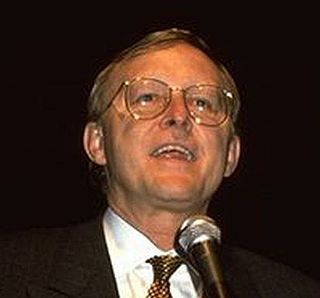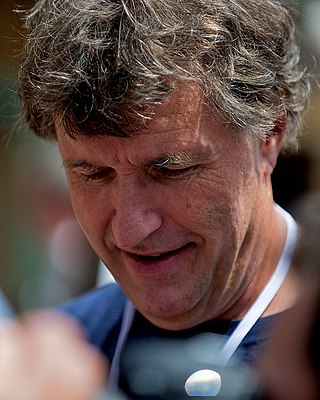Related Research Articles

The soybean, soy bean, or soya bean is a species of legume native to East Asia, widely grown for its edible bean, which has numerous uses.

James Henry Clark is an American entrepreneur and computer scientist. He founded several notable Silicon Valley technology companies, including Silicon Graphics, Netscape, myCFO, and Healtheon. His research work in computer graphics led to the development of systems for the fast rendering of three-dimensional computer images.

Agronomy is the science and technology of producing and using plants by agriculture for food, fuel, fiber, chemicals, recreation, or land conservation. Agronomy has come to include research of plant genetics, plant physiology, meteorology, and soil science. It is the application of a combination of sciences such as biology, chemistry, economics, ecology, earth science, and genetics. Professionals of agronomy are termed agronomists.
The College of Education and Human Sciences (CEHS) is one of nine colleges at the University of Nebraska–Lincoln (NU) in Lincoln, Nebraska, United States. The college was established on June 6, 2003 when the College of Human Resources and Family Sciences was merged with Teachers College. CEHS uses facilities across NU's City Campus and East Campus. Sherri Jones has served as dean of the college since 2019.

Prairie Schooner is a literary magazine published quarterly at the University of Nebraska–Lincoln with the cooperation of UNL's English Department and the University of Nebraska Press. It is based in Lincoln, Nebraska and was first published in 1926. It was founded by Lowry Wimberly and a small group of his students, who together formed the Wordsmith Chapter of Sigma Upsilon.

The National University of the Littoral is a public university in Argentina. It is based in Santa Fe, the capital of Santa Fe Province. It has colleges and other academic facilities in Esperanza, Reconquista and Gálvez, also in Santa Fe Province.

The International Quilt Museum at the University of Nebraska–Lincoln in Lincoln, Nebraska is the home of the largest known public collection of quilts in the world. Formerly known as the International Quilt Study Center and Museum, the current facility opened in 2008.
Cercospora kikuchii is a fungal plant pathogen that affects soybeans. It results in both the Cercospora leaf blight and purple seed stain diseases on soybean and is found almost worldwide. C. kikuchii produces the toxin cercosporin, as do a number of other Cercospora species.
Keith Ripp is a Wisconsin politician.

William Frakes is an American visual storyteller and educator based in Florida.
Sylvia Margaret Wiegand is an American mathematician.

Martin Andrew Massengale is an American academic. He served as the Chancellor of the University of Nebraska–Lincoln from 1981 to 1991, when he resigned to become the President of the University of Nebraska system.
Susan Jean Rosowski was a Western American scholar of literature and the works of Willa Cather.
Kenneth Arthur Bloom is an American particle physicist. He is a full professor at the University of Nebraska–Lincoln and an Elected Fellow of the American Physical Society.
Sandra B. Zellmer is an American lawyer, currently the Robert B. Daugherty Professor of Law at University of Nebraska–Lincoln College of Law and formerly holding the Hevelone Research Chair (2006–2007) and McCollum Research Chair (2008–2009).
Louise Harpman is a New York–based architect, urban designer, teacher, and author. She is a Professor of Architecture, Urban Design, and Sustainability at New York University’s Gallatin School of Individualized Study and the founding principal of the design and research practice, Louise Harpman__PROJECTS. She was previously a founder and principal of the architecture and design firm, Specht Harpman.
Franklin David Keim (1886-1956) was a professor at the University of Nebraska where he studied plant genetics, grasses, and grazing. He served as the chair of the University of Nebraska Department of Agronomy for 22 years from 1930 to 1952. He was elected a fellow of the American Society of Agronomy in 1937 and served as the president of the American Society of Agronomy in 1943. The University of Nebraska's Keim Hall is named in his honor.
Mathias Michael Schubert is a German physicist, J. A. Woollam Distinguished Professor of Electrical and Computer Engineering at the University of Nebraska-Lincoln, and member of the Nebraska Center for Materials and Nanoscience. He is a specialist in spectroscopic ellipsometry and has contributed to the development of blue and white LED, fast processors and efficient biological and chemical sensors. He is also visiting professor at Linkoping University and Associate Editor of the journal Applied Physics Letters.

Mary Rosalind Morris was a professor of plant cytogenetics at the University of Nebraska-Lincoln from 1947 to 1990. She was one of the first women to earn a doctoral degree in genetics and plant breeding from Cornell University, was the first female faculty member in the Department of Agronomy and Horticulture at UNL, and was the first woman fellow of the American Society of Agronomy. Her pioneering work on "misbehaving chromosomes" in wheat cytogenetics was internationally recognized. In 1980, she served as president of the Nebraska Academy of Sciences. She was awarded a fellowship with the American Association for the Advancement of Science and a Guggenheim Fellowship. She was born in Wales and immigrated with her family to Forest, Ontario, Canada as a child. She died on March 26, just before her 102nd birthday.

James C. Schnable is a plant geneticist and the Nebraska Corn Checkoff Presidential Chair at the University of Nebraska – Lincoln where his research program focuses on developing new technologies for crop genetics and breeding.
References
- ↑ "James Specht" . Retrieved May 12, 2017.
- ↑ "Jim Specht". unl.edu. Retrieved May 12, 2017.
- ↑ "Retirement". unl.edu. Retrieved May 12, 2017.